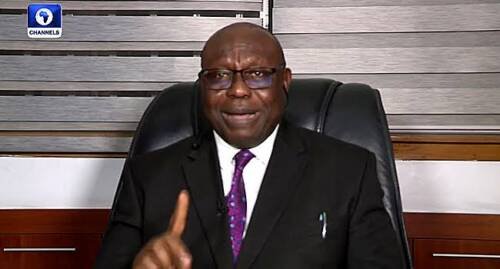The Independent National Electoral Commission (INEC), says it is unfair to judge the entire performance of the commission in the just concluded 2023 general election on the basis of glitch in the upload of the presidential election results.
INEC National Commissioner and Chairman, Information and Voter Education, Festus Okoye, disclosed this Tuesday during the presentation of the European Union Election Observation Mission (EU EOM) final report on the 2023 elections in Abuja.
He said in assessing the process, Nigerians must start from the positives.
Okoye said: “Were there positives to this election? My answer is in the affirmative. One, the commission registered a lot of Nigerians to vote during this election and the commission also engaged in a lot of voter and civic education that engaged the Nigerian people with the electoral process.”
“Secondly, the commission introduced technology in terms of voter registration; the commission introduced technology in terms of candidates nomination; the commission introduced technology in terms of accreditation of domestic and international observers, including the media. That is a positive side.”
The National commissioner added that the commission also introduced technology in the electoral process itself.
He said Nigerians have commended the commission for the introduction of Bimodal Voter Accreditation System (BVAS) for purposes of voter accreditation.
He noted that in terms of voter accreditation, nobody, nobody has faulted the functionality of the BVAS in all the elections we conducted.
“The only challenge this commission has had is the issue of result upload for presidential election only and I believe it is not fair to judge the entire performance of the commission on the basis of glitch in result upload for the presidential election,” Okoye said.
Earlier, the EU EOM called for legal and operational reforms in the electoral process to enhance transparency, inclusiveness and accountability in its electoral system.
It said the six priority recommendations were for the Nigerian government to remove ambiguities in the law, establish a publicly accountable selection process for INEC) members; Ensure real-time publication of and access to election results; Provide greater protection for media practitioners; Address discrimination against women in political life, and impunity regarding electoral offences.
Presenting its final report on the 2023 elections in Abuja, EU EOM Chief Observer, Barry Andrews, said in the lead up to the 2023 general election, Nigerian citizens demonstrated a clear commitment to the democratic process.
“That said, the election exposed enduring systemic weaknesses and therefore, signal a need for further legal and operational reforms to enhance transparency, inclusiveness, and accountability, he said.
The EU EOM stated that shortcomings in law and electoral administration hindered the conduct of well-run and inclusive elections and damaged trust in INEC.
The EU pointed out that the 2023 general election did not ensure a well-run transparent and inclusive democratic process as assured by INEC.
It added that public confidence and trust in INEC were severely damaged during the presidential poll and was not restored in state level elections, leading civil society to call for an independent audit of the entire process.
It added: “Abuse of incumbency by various political office holders distorted the playing field and widespread vote-buying detracted from an appropriate conduct of the elections.
“Incidents of organised violence shortly before and on election days in several states created an environment deterring voter’s participation. Media raised voters’ awareness, fact-checkers stood up against disinformation and civil society demanded INEC’s accountability.”

